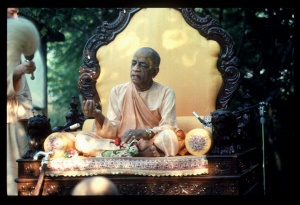SB 8.3.30: Difference between revisions
No edit summary |
(Vanibot #0054 edit - transform synonyms into clickable links, which search similar occurrences) |
||
| Line 24: | Line 24: | ||
<div class="synonyms"> | <div class="synonyms"> | ||
''śrī-śukaḥ uvāca'' | ''[//vanipedia.org/wiki/Special:VaniSearch?s=śrī&tab=syno_o&ds=1 śrī]-[//vanipedia.org/wiki/Special:VaniSearch?s=śukaḥ&tab=syno_o&ds=1 śukaḥ] [//vanipedia.org/wiki/Special:VaniSearch?s=uvāca&tab=syno_o&ds=1 uvāca]'' — Śrī Śukadeva Gosvāmī said; ''[//vanipedia.org/wiki/Special:VaniSearch?s=evam&tab=syno_o&ds=1 evam]'' — in this way; ''[//vanipedia.org/wiki/Special:VaniSearch?s=gajendram&tab=syno_o&ds=1 gajendram]'' — unto the King of the elephants, Gajendra; ''[//vanipedia.org/wiki/Special:VaniSearch?s=upavarṇita&tab=syno_o&ds=1 upavarṇita]'' — whose description; ''[//vanipedia.org/wiki/Special:VaniSearch?s=nirviśeṣam&tab=syno_o&ds=1 nirviśeṣam]'' — not directed to any particular person (but to the Supreme, although he did not know who the Supreme is); ''[//vanipedia.org/wiki/Special:VaniSearch?s=brahmā&tab=syno_o&ds=1 brahmā]-[//vanipedia.org/wiki/Special:VaniSearch?s=ādayaḥ&tab=syno_o&ds=1 ādayaḥ]'' — the demigods, beginning with Brahmā, Śiva, Indra and Candra; ''[//vanipedia.org/wiki/Special:VaniSearch?s=vividha&tab=syno_o&ds=1 vividha]'' — varieties; ''[//vanipedia.org/wiki/Special:VaniSearch?s=liṅga&tab=syno_o&ds=1 liṅga]-[//vanipedia.org/wiki/Special:VaniSearch?s=bhidā&tab=syno_o&ds=1 bhidā]'' — with separate forms; ''[//vanipedia.org/wiki/Special:VaniSearch?s=abhimānāḥ&tab=syno_o&ds=1 abhimānāḥ]'' — considering themselves separate authorities; ''[//vanipedia.org/wiki/Special:VaniSearch?s=na&tab=syno_o&ds=1 na]'' — not; ''[//vanipedia.org/wiki/Special:VaniSearch?s=ete&tab=syno_o&ds=1 ete]'' — all of them; ''[//vanipedia.org/wiki/Special:VaniSearch?s=yadā&tab=syno_o&ds=1 yadā]'' — when; ''[//vanipedia.org/wiki/Special:VaniSearch?s=upasasṛpuḥ&tab=syno_o&ds=1 upasasṛpuḥ]'' — approached; ''[//vanipedia.org/wiki/Special:VaniSearch?s=nikhila&tab=syno_o&ds=1 nikhila]-[//vanipedia.org/wiki/Special:VaniSearch?s=ātmakatvāt&tab=syno_o&ds=1 ātmakatvāt]'' — because the Supreme Personality of Godhead is the Supersoul of everyone; ''[//vanipedia.org/wiki/Special:VaniSearch?s=tatra&tab=syno_o&ds=1 tatra]'' — there; ''[//vanipedia.org/wiki/Special:VaniSearch?s=akhila&tab=syno_o&ds=1 akhila]'' — of the universe; ''[//vanipedia.org/wiki/Special:VaniSearch?s=amara&tab=syno_o&ds=1 amara]-[//vanipedia.org/wiki/Special:VaniSearch?s=mayaḥ&tab=syno_o&ds=1 mayaḥ]'' — consisting of the demigods (who are only external parts of the body); ''[//vanipedia.org/wiki/Special:VaniSearch?s=hariḥ&tab=syno_o&ds=1 hariḥ]'' — the Supreme Personality of Godhead, who can take away everything; ''[//vanipedia.org/wiki/Special:VaniSearch?s=āvirāsīt&tab=syno_o&ds=1 āvirāsīt]'' — appeared (before the elephant). | ||
</div> | </div> | ||
Latest revision as of 23:30, 18 February 2024

A.C. Bhaktivedanta Swami Prabhupada
TEXT 30
- śrī-śuka uvāca
- evaṁ gajendram upavarṇita-nirviśeṣaṁ
- brahmādayo vividha-liṅga-bhidābhimānāḥ
- naite yadopasasṛpur nikhilātmakatvāt
- tatrākhilāmara-mayo harir āvirāsīt
SYNONYMS
śrī-śukaḥ uvāca — Śrī Śukadeva Gosvāmī said; evam — in this way; gajendram — unto the King of the elephants, Gajendra; upavarṇita — whose description; nirviśeṣam — not directed to any particular person (but to the Supreme, although he did not know who the Supreme is); brahmā-ādayaḥ — the demigods, beginning with Brahmā, Śiva, Indra and Candra; vividha — varieties; liṅga-bhidā — with separate forms; abhimānāḥ — considering themselves separate authorities; na — not; ete — all of them; yadā — when; upasasṛpuḥ — approached; nikhila-ātmakatvāt — because the Supreme Personality of Godhead is the Supersoul of everyone; tatra — there; akhila — of the universe; amara-mayaḥ — consisting of the demigods (who are only external parts of the body); hariḥ — the Supreme Personality of Godhead, who can take away everything; āvirāsīt — appeared (before the elephant).
TRANSLATION
Śrī Śukadeva Gosvāmī continued: When the King of the elephants was describing the supreme authority, without mentioning any particular person, he did not invoke the demigods, headed by Lord Brahmā, Lord Śiva, Indra and Candra. Thus none of them approached him. However, because Lord Hari is the Supersoul, Puruṣottama, the Personality of Godhead, He appeared before Gajendra.
PURPORT
From the description of Gajendra, he apparently was aiming at the supreme authority although he did not know who the supreme authority is. He conjectured, "There is a supreme authority who is above everything." Under the circumstances, the Lord's various expansions, such as Lord Brahmā, Lord Śiva, Candra and Indra, all thought, "Gajendra is not asking our help. He is asking the help of the Supreme, who is above all of us." As Gajendra has described, the Supreme Lord has various parts and parcels, including the demigods, human beings and animals, all covered by separate forms. Although the demigods are in charge of maintaining different aspects of the universe, Gajendra thought that they were unable to rescue him. Hariṁ vinā naiva mṛtiṁ taranti: no one can rescue anyone from the dangers of birth, death, old age and disease. It is only the Supreme Personality of Godhead who can rescue one from the dangers of material existence. Therefore an intelligent person, to get free from this dangerous existence, approaches the Supreme Personality of Godhead, not any demigod. As confirmed in Bhagavad-gītā (BG 7.20), kāmais tais tair hṛta jñānāḥ prapadyante 'nya-devatāḥ: those who are unintelligent approach the various demigods for temporary material benefits. Actually, however, these demigods cannot rescue the living entity from the dangers of material existence. Like other living entities, the demigods are merely external parts of the Supreme Personality of Godhead's transcendental body. As stated in the Vedic mantras, sa ātma-aṅgāny anyā devatāḥ. Within the body is the ātmā, the soul, whereas the various parts of the body like the hands and legs are external. Similarly, the ātmā of the entire cosmic manifestation is Nārāyaṇa, Lord Viṣṇu, and all the demigods, human beings and other living entities are parts of His body.
It may also be concluded that since a tree lives on the strength of its root and when the root is nourished with water all the parts of the tree are nourished, one should worship the Supreme Personality of Godhead, who is the original root of everything. Although the Supreme Personality of Godhead is very difficult to approach, He is very near to us because He lives within our hearts. As soon as the Lord understands that one is seeking His favor by fully surrendering, naturally He immediately takes action. Therefore although the demigods did not come to the aid of Gajendra, the Supreme Personality of Godhead immediately appeared before him because of his fervent prayer. This does not mean that the demigods were angry with Gajendra, for actually when Lord Viṣṇu is worshiped, all the other demigods are also worshiped. Yasmin tuṣṭe jagat tuṣṭam: if the Supreme Personality of Godhead is satisfied, everyone is satisfied.
- yathā taror mūla-niṣecanena
- tṛpyanti tat-skandha-bhujopaśākhāḥ
- prāṇopahārāc ca yathendriyāṇāṁ
- tathaiva sarvārhaṇam acyutejyā
"As pouring water on the root of a tree energizes the trunk, branches, twigs and everything else, and as supplying food to the stomach enlivens the senses and limbs of the body, so simply worshiping the Supreme Personality of Godhead through devotional service automatically satisfies the demigods, who are parts of that Supreme Personality." (SB 4.31.14) When the Supreme Personality of Godhead is worshiped, all the demigods are satisfied.